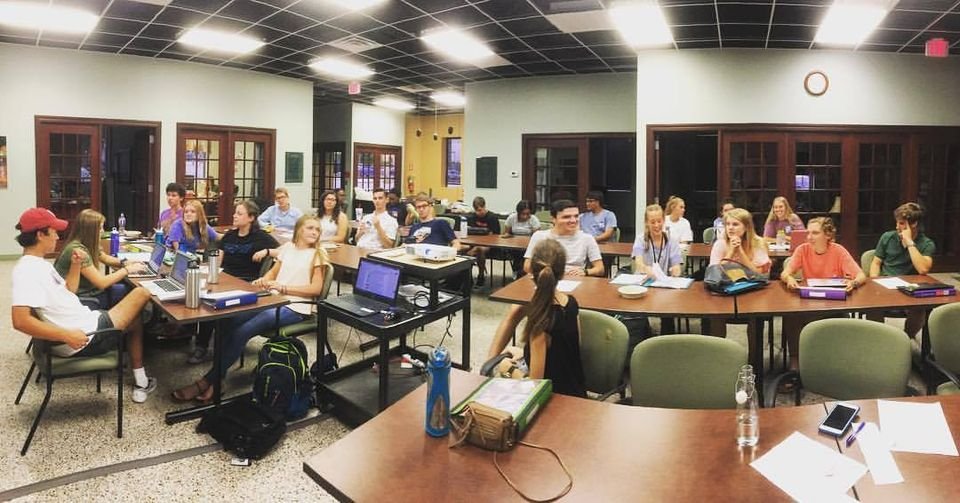Cohort 9: FAFSA COMPLETION
Cohort 9’s project Brink: College Bound, College Funded focused on increasing the accessibility of higher education by working to grow the use of the Free Application for Federal Student Aid (FAFSA) across Tulsa Public Schools. The cohort felt strongly that an individual’s financial situation should not dictate whether or not they can attend college. Moreover, the cohort’s research showed that FAFSA was an under-utilized resource for Oklahoma students to gain financial aid.
Cohort 9 worked closely with ImpactTulsa to develop the concept for Brink and implement it in the community. At the time, ImpactTulsa was in early stages of developing its Graduate918 programming to promote FAFSA, and the students decided to turbo-charge this effort. Students regularly attended ImpactTulsa board meetings, while ImpactTulsa Community Engagement Director Alex Paschal attended cohort meetings.
In close coordination and partnership with ImpactTulsa, Cohort 9 worked to create a comprehensive system to streamline the FAFSA completion process and foster a culture of FAFSA-mindedness in schools. The cohort created a suite of resources and tools for administrators and teachers to support students in navigating the application process, including instructional videos, powerpoint presentations, announcements, and a calendar of important dates and tasks. The cohort also created guidelines for the formation of a FAFSA steering committee of parents and students who would work to promote FAFSA in their school districts. These steps were complemented by a full-scale awareness campaign with ImpactTulsa’s communication team to raise students’ awareness of FAFSA, including through the wide distribution of fun posters, stickers and t-shirts with the slogan “Get off your FAFSA!”
Alex Paschal reflected on the co-creation process with students: “It was a fun, reciprocal relationship. They’d have big ideas, and then we’d work together to figure out the smaller components...”
“One of the biggest areas of added value was the perspective [the cohort] provided as students. They were a sounding board for what would resonate with other kids - their peers. They had first-hand experience with what resources students had access to and what gaps we needed to fill,” she reflected.
In year three, the students conducted extensive outreach to promote Brink’s message and encourage its adoption in schools and other relevant organizations. These efforts included:
A Brink Summit in September 2016, bringing together representatives from the US Department of Education and local schools including Memorial and Union High Schools, Rogers State University and the University of Tulsa;
A informational webinar that was attended by 50 organizations across Oklahoma, Kansas and Missouri; and
Outreach to the US Department of Education, resulting in the Brink project being spotlighted on the Federal Student Aid website.
Upon the cohort’s graduation, ImpactTulsa became the Brink project’s permanent home. Dr. Laura Latta, ImpactTulsa’s former Director of Post-Secondary Partnerships and Research, served as the organization’s lead on FAFSA promotion and similar initiatives. Looking back when she took on the role in 2019, she was impressed with the quality of the content and materials that she inherited and were originally developed under Brink. Dr. Latta confirmed that ImpactTulsa has continued to pull from those resources in its ongoing FAFSA-related programming in the years that followed. ImpactTulsa also sustained lasting relationships with Cohort 9 students. For example, as a result of the Brink connection, alumna Stevie Dowler-Vineyard interned with ImpactTulsa in 2019.
Ultimately, ImpactTulsa’s data shows that Cohort 9’s efforts contributed to a 4% increase in city-wide FAFSA completion rates in 2016- 17. Dr. Latta further reflected on the long- term impact of the partnership with Cohort 9: “[The students] really helped to draw a lot of awareness to the importance of FAFSA, and were effective in getting people to turn their attention to this... It helped to stir a lot of community awareness that lasts to this day.” She also notes that recently there has been a rejuvenated interest in FAFSA completion in the Tulsa community. In her current capacity as Executive Director for the Tulsa Higher Ed Consortium, she still thinks of the Brink materials as an asset she can draw upon. “I’m starting to think about dusting off some of the Brink materials again. It’s lasting work that still resonates.”




